Saturday, December 31, 2005
I don’t even like the Left and this was still troubling….
Next thing you know, it’ll turn out that there weren’t bits of people being ground into hamburger meat.
Friday, December 30, 2005
Sometimes it’s best to run roughshod over the opposition….
VDH takes it to the hole
Thursday, December 29, 2005
The country formerly known as Burma continues to play hell with map makers
The decision to shift the government of Myanmar (Burma) to a mountainous inlandPerhaps the new locale was chosen because of its convenience and comfort?
hideaway has flabbergasted the world--and the military regime's government
workers.
It's [Pyinmana] … prone to malaria, full of poisonous snakes and generally a
miserable backwater. No one understands why anyone would choose to move there.
Well, no doubt, the government planned the relocation well and will have everything set up for the arriving government workers, right?
…. When they arrived, they found there were no apartments built yet, so
they are sleeping at their offices. They eat meals prepared by co-workers.
Fortunately, the current government workers can choose to leave their posts so they can stay with their families and choose to join the private sector. Psych!
By law, government officials cannot resign without permission--which is not
often granted.
Sounds like the government is trying to make itself less accessible to the people.
Wednesday, December 28, 2005
The reality community holds these assertions to be self evident
Tuesday, December 27, 2005
Peter Cushing
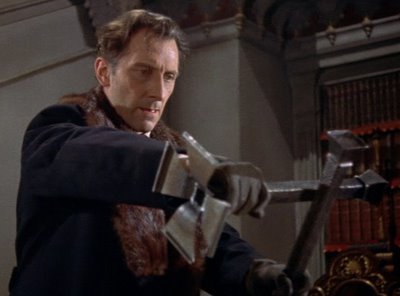
His best quality? His main strength as a vampire killer? He’s able to take command of the situation – always. He stays calm and he thinks and you never see him lose his nerve. He’s a man of action, but he’s also book learned. He tends to create the opportunities to turn tragedies into successes. Ever wonder what you should do if you got bit? Follow and learn:
Ever wonder what you should do if you got bit? Follow and learn:
First, heat an iron –
 Then sear the bite thoroughly –
Then sear the bite thoroughly –
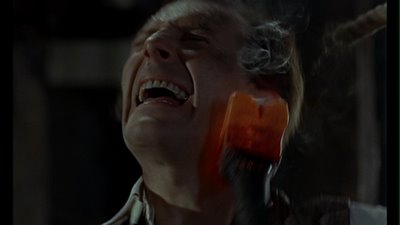 Dowse generously with holy water –
Dowse generously with holy water – Wait –
Wait –  Heaven takes care of the rest –
Heaven takes care of the rest –
He enters a room without hesitation – though he's mindful of the danger. I’m not sure where his confidence comes from since he never seems foolhardly or reckless. Quite the contrary, he’s inquisitive and direct, as here, where he deduces the fears of the local innkeeper right in front of him – tells him he knows what they are afraid of and that he knows it is evil: And when it’s time to confront evil, face to face, his steely nerves allow him to act unassuming and casual. Because he knows the vampire is not an athiest.
And when it’s time to confront evil, face to face, his steely nerves allow him to act unassuming and casual. Because he knows the vampire is not an athiest.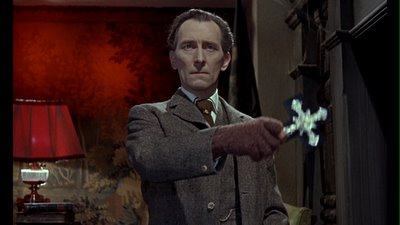
And you can always count on a good finish, as in Brides of Dracula, where Cushing turns a windmill into a crucifix.

Stills from the Horror of Dracula and The Brides of Dracula.
China prefers no reform at the UN
Vice-Foreign Minister Qiao Zonghuai Monday reiterated China's position in the
reform of the United Nations (UN), saying "priority (of the reform) should be
given to increasing the representation of developing countries especially
African countries."
Translation: the 2nd largest economy in the world should not be on the security council.
Monday, December 26, 2005
Is Newsweek even trying anymore?
Back in the 1980s, when I was living in Johannesburg and reporting on apartheid
South Africa, a white neighbor proffered a tasteless confession. She was "quite
relieved," she told me, that new media restrictions prohibited our reporting on
government repression. No matter that Pretoria was detaining tens of thousands
of people without real evidence of wrongdoing. No matter that many of them,
including children, were being tortured—sometimes to death. No matter that
government hit squads were killing political opponents. No matter that police
were shooting into crowds of black civilians protesting against their
disenfranchisement. "It's so nice," confided my neighbor, "not to open the
papers and read all that bad news."
Yes, the comparisons are obvious, aren’t they? But the manure doesn’t stop there. Getz describes Desmond Tutu’s reaction – not to the spy story, but to the 2004 election?
Tutu recalled teaching in Jacksonville, Fla., when Bush won re-election in 2004.
"I was shocked," he said, "because I had naively believed all these many years
that Americans genuinely believed in freedom of speech. [But I] discovered there
that when you made an utterance that was remotely contrary to what the White
House was saying, then they attacked you.
I know I’ve been living in the Bush bubble, but what is the Tutu talking about and what does the 2004 election have to do with anything?
Saturday, December 24, 2005
Friday, December 23, 2005
This is about right
"...the people who are worried about civil liberties in this case, being somebody from Karachi calling somebody in San Diego and telling them where to plant the little nasty sticks. That's one level of civil rights violation, if it is. The other level of civil rights violation is martial law, because Washington has been taken out, and we have to take our orders from somebody in a NORAD bunker deep in the southwest. And you want to see civil rights violations, you ain't seen nothing yet."
Scroll down on Radio Blogger to see the Thursday Mark Steyn segment - where he discusses the House of Lords, aka the Senate.
Tuesday, December 20, 2005
If it looks like treason, smells like treason and acts like treason….
Another thing is certain: this president can’t fart sideways without his opponents screaming that he’s stifling debate or lashing out. It’s not every day that Newsweek sounds as unhinged and hysterical as kos or nonfamous.
UPDATE: This is a house of cards. Drudge did a little spade work and found executive orders from Clinton and Carter authorizing warrantless searches and surveillance. I, for one, have never been as impressed with Carter as in this instance. And here's Andrew McCarthy's take. Make no mistake, Democrats will proceed with the rhetoric of fear.
Meanwhile: Hugh Hewitt had Jonathan Alter, the writer of the Snoopgate piece, on his show. You can see a transcript of the interview here.
And finally - goodbye.
Sunday, December 18, 2005
It's about his sche-du-al....
Friday, December 16, 2005
The intellingence walls that the 9/11 commission warned us about are returning
Pelosi says there's no reason to have a Democratic position on Iraq
Thursday, December 15, 2005
Freedom on the march
UPDATE: Since I didn't brave the car bombs to cast an Iraqi ballot, I feel like dying my finger purple is not the best way to show my support. However, what better way to express support and confidence with the Iraqi people than buying dinars? It's a win-win: you're telling them that you believe the economy is going to boom, and when it does, you stand to make a killing - though not in the self whacking sense. Just be sure that the bills are legit (i.e. - no Saddam picture).
Tuesday, December 13, 2005
Israel's going to need a bigger fence
Monday, December 12, 2005
Gateway Pundit also has comprehensive coverage of the Iraqi elections
Gateway pundit has the most complete coverage
Saturday, December 10, 2005
Friday, December 09, 2005
The Iranian nuke situation may escalate into discussions....
Mr ElBaradei said European negotiators should continue talking to Iran.
"The parties need to sit together, discuss their grievances and reach a solution," he said.
"If we can do that without escalating the problem, all the much better."
Give that man a Nobel Prize!
Stop the NYTimes presses: Tax cuts work!
Thursday, December 08, 2005
While it's important to remember December 7th
Wednesday, December 07, 2005
Tuesday, December 06, 2005
Monday, December 05, 2005
"the idea that we're going to win the war in Iraq is an idea which is just plain wrong..."
"I've seen this before in my life. This is the same situation we had in Vietnam. Everybody then kept saying, 'just another year, just stay the course, we'll have a victory.' Well, we didn't have a victory, and this policy cost the lives of an additional 25,000 troops because we were too stubborn to recognize what was happening."
"I think we need a strategic redeployment over a period of two years," Dean said. "Bring the 80,000 National Guard and Reserve troops home immediately. They don't belong in a conflict like this anyway. We ought to have a redeployment to Afghanistan of 20,000 troops, we don't have enough troops to do the job there and its a place where we are welcome. And we need a force in the Middle East, not in Iraq but in a friendly neighboring country to fight (terrorist leader Musab) Zarqawi, who came to Iraq after this invasion. We've got to get the target off the backs of American troops."
Note to GOP: Dean just handed you the stick, now beat him over the head with it. We'll see how many of the Democrats in Congress side with him over the President.
A wake-up call for who?
To believe that last statement, you’d have to disregard the pro-American leaders recently voted in by the people in places like Indonesia, Australia, Mongolia and…Japan. And I’d bet that the Taiwanese people feel safer and freer under the U.S. military than that of China. And if push came to shove, I would bet on the S. Koreans to come to their senses and side with the U.S. instead of China. And if the Burmese could decide for themselves, little doubt they’d cling to the U.S. over their own autocracy or China’s.
Zakaria, like most other Newsweek and Time reporters, apparently believes that overly hedging your bets is the best way to create an aura of objectivity. As in a recent piece of his where hs was saying that China is a growing threat, war might be on the horizon, but then again it’s unlikely, but there are ominous clouds nonetheless. Does the future belong to China? Maybe, maybe not. What’s the point? The problem is that by layering caveat over caveat, Zakaria convolutes everything until his article is practically meaningless.
If you dig down deep enough in his current article to hit the thin vein of logic therein, that the U.S. needs to pay more attention to Asia as a whole, then you’ve reached a conclusion the that Bush Administration reached quite some time ago. Zakaria laments that everyone in Washington is too dense to know that the charming/uncharming China is out-charming/uncharming us…but hold on there, Fareed! Bush just got back from the region where he tried to put a focus on American relations to the region. Bush deftly criticized China’s human rights record and encouraged reform there as well. He also did so through other countries in the region, and behind the cameras, Rice was doing the same. Bush was the first president ever to visit Mongolia – an ally on the war on terror and a country that worries about its southern neighbor. Bush’s message was comprehensive, dynamic and forward looking – touching on increasing freedom, reforming government, taking care of health crises and improving trade, etc. The press, of which Zakaria is a member, had little interest in Bush’s message. I happened to watch much of Bush’s visit on Japanese television & it seemed that every time an English speaking journalist opened his/her mouth it was to ask about Iraq or prison abuse or the Mertha deal – just to let you know what they consider the pressing issue to be. True enough, Iraq has occupied much of the President's time. Yet, he still has not forgotten about all the things that the press has forgotten: Afghanistan, trade issues everywhere, bird flu (though if that can be used against the President, they’ll quickly remember), Taiwan, etc. It’s true that Zakaria has been warning about Chinese power for years, but when he frets that there is nobody in Washington to define the long term American role in Asia, he betrays his bias against the President who has been defining that very role since his first day in office. Perhaps the wake up Zakaria seeks is for his own colleagues.
Friday, December 02, 2005
Squirrel padawons
Thursday, November 24, 2005
Happy Thanksgiving
 I had a great time in Japan, but the trip was far too short and I did not want to return. Hokkaido was pretty cold at times, but the weather wasn't too bad. Sapporo is a tiny town (about 1.5 million) compared to the mega city that is Tokyo. It's also pretty new, which means it had a easy to navigate grid structure to the roads. Highlights? The fish and crabs were plentiful and tasty as was the beer and sake. My tongue is not so acute as to notice the difference between fish in Hokkaido and fish in the Kanto area - but Tomoe's was and she was the one that marked the trip as an eating tour. Hokkaido is also known for dairy products and chocolate and lamb. Not things you normally associate with Japan. The milk was exceedingly delicious and I made sure to have some every morning with our lunch buffet. Through the miracle of Japanese cuisine, I stuffed myself repeatedly and still lost weight.
I had a great time in Japan, but the trip was far too short and I did not want to return. Hokkaido was pretty cold at times, but the weather wasn't too bad. Sapporo is a tiny town (about 1.5 million) compared to the mega city that is Tokyo. It's also pretty new, which means it had a easy to navigate grid structure to the roads. Highlights? The fish and crabs were plentiful and tasty as was the beer and sake. My tongue is not so acute as to notice the difference between fish in Hokkaido and fish in the Kanto area - but Tomoe's was and she was the one that marked the trip as an eating tour. Hokkaido is also known for dairy products and chocolate and lamb. Not things you normally associate with Japan. The milk was exceedingly delicious and I made sure to have some every morning with our lunch buffet. Through the miracle of Japanese cuisine, I stuffed myself repeatedly and still lost weight.Sapporo has a lot of western influences in the architecture. I wish I'd taken more photos of some of the government buildings and Christian churches. Regardless, there were several picturesque landmarks such as this TV tower.

But you can't go to Sapporo without visiting the fish markets. Oddly, a place like the fish market below has no fish smell and a floor almost clean enough to lick - only in Japan.

Within that market were little sushi stalls.

Check out the generous serving of salmon!

I didn't get any pictures of the breweries there, but here's a diagram of the sake making process found at the Sake Musuem (which was not really a museum so much as a store).
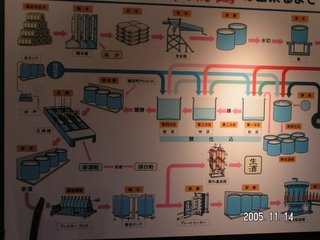
Hokodate is a much smaller town towards the southern tip of Hokkaido - but well worth a visit because of a lot of little museums, convenient street cars and historic buildings (again, with a western influence) like this government building
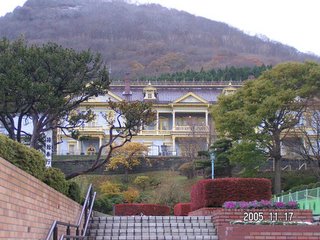
Not the best of pictures, but you get the idea. There's also the Goryaku, a large western style fort built at the time of the Meiji revolution (1860s) - which we did not have time to visit. Photo from this site.

We took a tour of the harbor and I was pleased to see signs of Japanese military vessels like this destroyer.
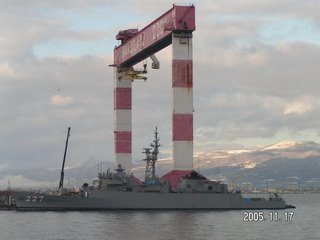
And this Coast Guard vessel, which, according to the guide on the ship, routinely plays cat and mouse with N. Korean vessels in the area. This is actually the larger of two vessels which lends helicopter support to the smaller one (not shown).

The rest of the trip was spent in Tokyo & unfortunately I didn't get very many sightseeing pictures from there. But I did get plenty of photos of Tomoe's two nephews - who where not the least bit afraid of the ugly pink-skinned monster.

Sunday, November 13, 2005
I`ve been in Japan for the past few days
Monday, November 07, 2005
Sunday, November 06, 2005
Friday, November 04, 2005
With a density reminiscent of Dan Rather, Kristoff more or less makes a correction
“First, he denies that he stated that the Vice President's office, not the
CIA, sent Ambassador Wilson to Niger, only that Cheney wanted an investigation
by somebody. But Kristof admits: 'In fairness, though, it is true that Cheney
apparently didn't know that Wilson had been dispatched. If I'd known that I
would have said so.'
"Then he turns to the matter of his column reporting that Wilson had
actually seen (forged) documents on the uranium deal, when he didn't. Kristof
explains: 'Wilson has said that he misspoke when he made references to the
documents to me and to two other journalists.'
“'But it does seem to be true that Wilson claims to have debunked the Niger
deal more firmly than some people remember him debunking it.'”
Translation – Wilson debunked nothing. Close enough, though, for the NYTimes.
Ramadan celebrations spread beyond Paris, beyond Ramadan
A good day for the Alaskan carribou
Thursday, November 03, 2005
Ramadan festivities continue in Paris
Wednesday, November 02, 2005
Tuesday, November 01, 2005
Humorous exchange between Howard Dean & Chris Matthews
Monday, October 31, 2005
Here’s a perfect example of the difference between Japan and China.
Reading the article, you can almost piece together the missing verses from the song “Imagine”
Imagine no food
No tableware or pots and pans
Nothing to masticate or digest
Except the tree bark and grass
Or the flesh of your neighbor….
Okay, I’m no songwriter, but you get the idea.
Friday, October 28, 2005
Kerry still hasn't found his voice on the war
Later today, I will deliver a major speech on the war in Iraq.
It asks a hard and essential question: how do we bring our troops
home within a reasonable and responsible timeframe, while achieving what needs
to be achieved in Iraq?
One thing is certain. It isn’t by continuing to pursue the Bush
administration’s “stay for as long as it takes” rhetoric.
Blair: Pretentious blowhard. If “achieving what needs to be achieved in Iraq” is key, how does one avoid the requirement to “stay for as long as it takes”?
Indeed. And his speech? (excerpts here) Well, he likes to talk about asking the hard questions, but never seems to get around to the hard questions. When he finally drones his way to the "plan" portion of his argument - he provides absolutely nothing useful. He thinks there should be a political solution between the Sunnis and Shia - yet, he refuses to acknowlege that that's what all the constitution business is about. He thinks we need to build up Iraqi security, but refuses to acknowlege that that's what the U.S. has been doing. In short, any good ideas that he has are already in motion. And the meat of his plan? for Bush to provide a ....plan:
"The Administration must immediately give Congress and the American people a
detailed plan for the transfer of military and police responsibilities on a
sector by sector basis to Iraqis so the majority of our combat forces can be
withdrawn. No more shell games, no more false reports of progress, but specific
and measurable goals."
Not only is that not a plan, but it's just a bad idea. Bush's timelines are right on - transfer authority here, elect a temporary government here, develop a constitution here, etc. Those timelines are good to make known. They keep the wheel turning. That's the plan that Kerry is too blind to see. His timelines are geared towards withdrawal. Personally, I'd like to see no mention of pulling troops out - even when it is happening. If we cut our troop levels in half, best not to even acknowlege that we did it until years later. Hold those cards close to the vest. As Iraqis stand up, we'll stand down - that's as specific as you should get.
Thursday, October 27, 2005
Ugh! Miers withdraws.
Wednesday, October 26, 2005
Straddling the fence
"Clinton said she doesn't support a deadline for withdrawing troops from Iraq nor
does she support leaving our troops there for an open-ended period."
Sounds like a Democrat.
French treachery?
"Italian diplomats have claimed that, by disseminating bogus documents
stating that Iraq was trying to buy low-grade "yellowcake" uranium from
Niger, France was trying to "set up" Britain and America in the hope that
when the mistake was revealed it would undermine the case for war, which it
wanted to prevent."
And yet the pith of the 16 words remains firm.
Tuesday, October 25, 2005
Another pro-American leader gets reelected
Congratulations to the Iraqis for passing their constitution!
Monday, October 24, 2005
Saturday, October 22, 2005
Chinese hysteria
Despite the strong opposition from China and other Asian countries and their peoples as well as from the people of insight in Japan, Koizumi provoked disturbances and randomly hurt the feelings and dignity of the victimized countries and their peoples during the war and seriously undermined Sino-Japanese relations. The move evokes great indignation in Chinese people.
This year marks the 60th anniversary of the victory in China's War of Resistance against Japanese Aggression and the World Anti-Fascist War. Such a move challenges the human conscience and international justice.
In April this year, Chinese President Hu Jintao put forward a five-point proposal on the Sino-Japanese relations at the Asian-African summit. Koizumi's action ignored the sincere wishes of the Chinese government and people for improving the Sino-Japanese ties...
This 5 Point Plan should not be confused with Jintao’s 5 Point Plan aimed at improving relations with Thailand, or the 5 Point Plan on how to handle the Middle East, or the 5 Point Plan to improve relations with India or the 4 Point Plan in dealing with Taiwan. Was that last plan missing a Point? Indeed it was, but not to worry, there was also a 5 Point anti-secession law that was passed this year and another 5 Point proposal for relations between the KMT and the People’s government. That’s 14 Points towards Taiwan alone, if you’re keeping score. But those aren’t freedom leaning Wilsonian points. One might assume that Hu’s 5 Points issue resolution schematic extends to other areas as well:
5 Point Strategy to oppressing religious minorities,
5 Point Strategy to establishing an obedient press,
5 Point Strategy to defending Tinnamen Square from freedom,
maybe you could throw in…
5 Point Strategy to increasing fireworks production in elementary school factories,
or, closer to the boudoir….
4 Point Strategy to pleasing Mrs. Hu (the fifth point banned by the one child policy).
If Hu were to team up with a big name publisher, his 5 Point strategies could replace all the 8 Step strategies currently in the Diplomatic self-help section of your local Borders.
Adopting a numerically consistent method to solve issues is fine, in itself. The unavoidable generic and vague types of steps like “…economic and trade cooperation should be expanded” say little, but may help keep the eye on the ball. Yet, it hardly represents a great vision forward. And when you don’t respect those basic generic principles in the first place, it fails to mean anything at all. Going back to Japan, check out Hu’s 5 Points:
First, friendly and co-operative Sino-Japanese relations orientated towards the 21st century should be developed on the basis of the three political documents, namely, the Sino-Japanese Joint Statement, the Sino-Japanese Treaty of Peace and Friendship and the Sino-Japanese Joint Declaration.
Second, the issue of history should be taken seriously by adhering to the principle of "taking history as a mirror and looking forward to the future." Japan should back up its remorse on wartime aggression with action and deal with historical issues in a serious and prudent manner.
In the first point, China believes that both parties should respect previous agreements (here, here and here) in order to look forward. In the second point, China shucks away the the idea of looking to the future expressed in the first point and starts dwelling on the past. History is a mirror, alright, but only when it concerns Japan, it seems – never China. When China urges Japan to “action” in backing up it’s “remorse”, it means reparations, yet the Joint Communique, one of Hu’s cited agreements, explicity states:
5. The Government of the People's Republic of China declares that in the interest of the friendship between the Chinese and the Japanese peoples, it renounces its demand for war reparation from Japan.
Oh, well. China is more concerned in holding Japan accountable to the People's interpretation of agreements Japan made with the KMT regarding Taiwan than it is about holding itself accountable for it’s own direct agreements made when it was the negiotiating party of China. For it’s own part, Japan has kept the agreements it made to the KMT and honored them with the communists.
With almost all the agreements betweent the two countries, China plays fast and loose with the proclaimed spirit of the negotiations while Japan follows that spirit as closely as possible while maintaining its right of sovereignty. Consider some more of these points alluded to in the agreements cited in Hu’s 5 Points:
from the 1972 communique –
“Neither of the two countries should seek hegemony in the Asia-Pacific region and each is opposed to efforts by any other country or group of countries to establish such hegemony.”
What imperial ambitions have the Japanese expressed or taken action to achieve since 1945? None. Yet, China has gobbled up Tibet, initiated a border war with Vietnam, built up massive military resources geared toward an invasion of Taiwan and poured a million troops into the Korean penninsula to ensure that it was either communist or divided. And it appears that China will be prone to future sable rattling, if not military action, over the Sino-Russo border. It’s obvious that Imperial China, thirsty for land and resources, is alive and well and seeking Asian hegemony.
From the 1998 Declaration:
Both sides express support for the reforms of the United Nations including the reform of the Security Council, in order for the United Nations to further embody the common wish and collective will of all Members in its activities and policy decision making process.Yet China is vehemently opposed to letting the second largest economy joining that same Security Council. And any reform of the Security Council that might do something about places like Sudan and Iran has been stiff armed by China.
Both sides stress the importance of the ultimate elimination of nuclear weapons, and oppose the proliferation of nuclear weapons in any form whatsoever, and furthermore, strongly call upon the nations concerned to cease all nuclear testing and nuclear arms race, in order to contribute to the peace and stability of the Asian region and the world.Well, not quite, when it comes to China. The People’s government is not very concerned with N. Korean nuclear capabilities, unless it will mean nuclear bombs in S. Korea, Japan or [gasp] Taiwan. When or if Japan resorts to attaining nuclear weapons, it will not be because of an imperial quest, but to ensure its defense.
Believe it or not, there was a brief moment in history when China acknowleged Japanese economic benevolence:
The Chinese side expressed its gratitude for the economic cooperation extended by Japan to China. The Japanese side reiterated that it will continue to support China's efforts for the early accession to the WTO.
And as an aside, Japan did keep it’s commitment to China and the latter is currently a WTO nation.
Continuing with the 5 Point Plan:
Third, the Taiwan question should be handled properly.To China, this means repeated threats of invasion backed by hundreds of missiles pointed at the small islands as well as military simulations of an amphibious assault. To Japan, it means recognizing the one China solution where the two entities (Taiwain and China) can willing and peacefully unite, and in that light, Japan will help defend the island from a mainland invasion until peaceful and mutual reunification can occur.
Fourth, the differences between China and Japan should be dealt with through dialogue and negotiation on equal ground.
Yet, Point 2 denies Japan that equal ground.
Lastly, friendly non-governmental exchanges and co-operation should be further enhanced to strengthen mutual understanding, expand common interests and develop a healthy bilateral relationship.Which apparently allows China to stoke the anti-Japanese fire so fully that Japanese students in China cannot be guaranteed of personal safety from angry mobs and Japanese businesses (and even businesses perceived to be Japaneses) face the possibility of damage and looting during the all to common anti-Japanese protests.
How does the People’s government stoke those fires? Well, how about the official Chinese claim that Japan is responsible for 38 million deaths in China? No prudent method of estimation could get anywhere close to that number. The actual damage caused by the Japanese occupation is bad, there’s no need to exaggerate it. Yet, the Chinese completely neglect the hardships it inflicted on itself through not only the sixty plus years of civil strife before 1949. To them, one big pile of Chinses bodies is one big pile and it’s better to blame it all on the Japanese than take any responsibility for it. And that’s not to mention the monumental damage caused Mao, himself, since the People’s Party has been in power. To this day China maintains a record of oppression, whether it’s cracking down on democratic movements or just good old fashion religious persecution. When the government’s official position is based on crap information, then it’s not a surprising to see misguided assumptions like the one made in that recent People’s editorial:
The Japanese militarism hurt the Chinese people the most in the modern history.Especially, if the editorialist has a state provided portrait of Moa glaring down at him. A reasonable man can only concede to that statement under the threat of torture. Otherwise, it is misleading and serves absolutely no purpose in strenthening “mutual understanding, expand common interests…” with Japan.
The editorial relies on misinformation throughout – just as the People’s diplomacy relies on its own insincerity:
The Osaka High Court made a ruling recently that Koizumi's visit to Yasukuni violated Japanese constitution and Koizumi's visit made light of the law.Not mentioned is that Koizumi made the visit as a private Japanese citizen and not as a public official, which is what the weak kneed Osaka High Court objected to in it’s statement. Perhaps Koizumi might propose ceasing his personal visits to the shrine if the People’s government would agree to putting up a memorial honoring the dead students at Tinnamen Square. On second thought, that would violate “the principles of mutual respect for sovereignty and territorial integrity” set forth in the Joint Communique. One would think that same principle of sovereignty would allow Koizumi to go where he pleased on Japanese soil, so long as he wasn’t stirring up Japanese hostility towards China. But no, such action by Koizumi “evokes great indignation in Chinese people..” and presumably threatens the future relations between the two contries. After all, as the editorial points out, the day Koizumi paid tribute at the shrine “was a day when the Chinese people warmly congratulated the successful landing of China's manned Shenzhou VI. So his action is a serious provocation against the entire Chinese people.”
When you’re dealing with such sensitivity, you can’t expect rational negotiations.
Why do the Chinese people, whose feelings were seriously hurt, cannot say no?
The truth is that the Chinese can forever say “no” to Japan. Is Japan obligated to listen? The only time that the Chinese citizen is not allowed to say “no” is when it comes to disagreeing with his own government.
The editorial concludes:
Just think, how does a country, that has no rational knowledge and correct attitude towards its own aggressive history and war crimes, win trust from the world, and the leader of the country goes his own way and ignores human moral principles? If really wanting to win confidence from its Asian neighboring nations and the international community and playing an active role inJapan has shown without a shadow of a doubt that it is a responsible benevolent country. Its textbooks may gloss over its imperialist past, but its actions in the last 60 years indicate that it has learned the lessons of its crimes. China has not. It continues to violate any expression it has made towards creating a peaceful and prosperous region. Perhaps Hu has a 5 Point Plan to fix that.
international affairs, Japan must take compelling actual actions to show that it "has history as lessons and faces the future''
Thursday, October 20, 2005
Wednesday, October 19, 2005
Misunderestimating Bush: take 32,457
The Bush administration would claim that it is expanding the war in Iraq into Syria to try to bring it to an end, the kind of screwy non-logic that kept us in Vietnam for a decade and cost 58,193 American lives in the end.
Others [Dan Simpson perhaps?] would see the attacks in Syria as a desperation political move on the part of an administration with its back against the wall, with a failed war, an economy plagued by inflation --1.2 percent in September, a 14.4 percent annual rate if it continues -- the weak response to Hurricane Katrina, grand jury and other investigatory attention to senior executive and legislative officials, and the bird flu flapping its wings toward us on the horizon. The idea, I suppose, is to distract us by an attack on Syria, now specifically targeted by U.S. Ambassador to Iraq Zalmay Khalilzad.
Of course, such an invasion would never have anything to do with winning the War on Terror. Why, that's just too absurd to even consider. Mr. Simpson even believes that the current state of Iraq is worse for Israel than when Saddam was hiding missile programs and cutting checks to the families of Palestinian self whackers:
Could anyone argue that Israel is made safer by a burning conflict in Iraq that has now attracted Islamic extremist fighters from across the Middle East, Europe and Asia? Saddam Hussein's regime was bad, but this is a good deal worse, and looks endless.
By this description, one might get the idea that Simpson sees the insurrection as made up largely of outsiders trying to destroy the U.S. mission in Iraq. But just wait until he has to crap on the president from another direction - he'll completely ignore that role of outsiders to paint the "insurrection" as a native germ because all Iraqis are against the U.S. Whatever fits the moment.
In regards to our options in Syria, I believe David Ignatius is orbiting a little closer to earth in his column:
An angry Bush administration, meanwhile, was actively exploring a policy of regime change several months ago. Bush was furious at Assad for not controlling the insurgents who are using Syria as a base for their attacks on U.S. troops in Iraq, and the president pressed his national security team to explore whether there were good alternatives to Assad.
But the administration pulled back from its regime-change enthusiasm in recent weeks, and officials now speak of the need for "policy" change. A big factor is the new director of national intelligence, John Negroponte, and his analysts at the National Intelligence Council. They have been warning Bush that if Assad is toppled, the result isn't likely to be better in terms of regional stability, and it could well be worse.
I don't know how accurate that is - whether that's what Negroponte is saying or whether he's right if he is saying it. But when it comes to invading Syria, I would put money on Bush mulling over security concerns and not just running cover for other perceived disasters.
Rumsfeld urges openness and democracy in China
"Every society has to be vigilant against another type of great wall that can be a burden on man's talents and is borne from fear of them -- a wall that limits speech, information or choices..."
"While there is no model that is perfect for every nation at every time in its development, a look across the globe suggests that societies that tend to encourage more open markets and freer systems are societies where people are enjoying the greatest opportunities..."
Tuesday, October 18, 2005
If Ronnie Earle is on a mission from God
Steyn on Smurfistan
Good luck to Unicef and all. But I can't help thinking that, if you are that concerned for children in war zones, you might have done something closer to what real conflict is like in those places. In Rwanda, Sudan and a big chunk of west Africa, air strikes are few and far between. Instead,
millions get hacked to death by machetes. Even on the very borders of Eutopia, hundreds of thousands died in the Balkans in mostly low-tech, non-state-of-the-art ways.
In 2003, Charles Onyango-Obbo wrote a fascinating column in the East African musing on the resurgence of cannibalism, after reports that Ugandan-backed rebels in the Congo were making surviving members of their victims' families eat the body parts of their loved ones.
"While colonialism is bad," he said, "the coloniser who arrives by plane, vehicle or ship is better - because he will have to build an airport, road or harbour - than the one who, like the Ugandan army, arrived and withdrew from most of eastern Congo on foot." Just so. If you're going to be attacked, it's best to be attacked by a relatively advanced enemy. Compared to being force-fed Grandfather Smurf's genitals, having his village strafed in some clinical air strike is about the least worst option for Baby Smurf.
Monday, October 17, 2005
The non-issue that won't go away
Meanwhile, the Japanese face certain threats that they shouldn't ignore. And they are not.
Mugabe criticizes Bush & Blair and is applauded...
Saturday, October 15, 2005
Neither lefties nor terrorists were able to stop Iraq's march to freedom today
Update: Glenn Reynolds remembers the Iraq vote in 2002. Compare & contrast.
Update: Lileks talks about a few protestors he saw in Minneapolis.
Thursday, October 13, 2005
Postal reforms are passed in the lower house
"I believe this is the last statement I can make."
Monday, October 10, 2005
Thursday, October 06, 2005
Wednesday, October 05, 2005
The party of the first part will hereby remain the party of the first part
Tuesday, October 04, 2005
Steyn looks at Bali and terrorists in general
Sunday, October 02, 2005
I thought there would be more discussion about last week’s Bob Dylan documentary on PBS….
John Derbyshire had a typical piece – mainly about where he was when he first discovered Dylan. While a testament to the artist, it had little to do with Scorcese’s film. Bulldog at Ankle Biting Pundits, apparently not a Dylan fan, asked his readers to explain why Dylan was such a big deal. Sadly, the readers weren’t much help. In fact, few even came to his defense - and of those few, nobody praised Dylan’s singing ability. That’s a pity, since, by my seemingly singular estimation, he’s the best singer out there.
David Yaffe at Slate had an actual review, though he seemed to take exception that Dylan’s new documentary came “complete with a Starbucks tie-in, an Apple logo”. Such is life, Yaffe, such is life. He also faulted it for not mentioning drugs. Neither gripe warrants much attention. Dylan was an opportunist at 19 and he still is at 64. Like all rock stars. And drugs? Such an omission in No Direction Home is very minor, especially when you can just look at the young Dylan and tell the score. Yaffe seemed to notice this:
…to the bleary-eyed near rock 'n' roll suicide of '66. We witness him singing "I'm not weary" in a '66 performance of "Mr. Tambourine Man," but he looks weary as hell. Has any 25-year-old ever been so jaded?
Yaffe makes other good observations, but treats Dylan’s control over the project as he would some politician engaged in a cover up:
But before you get too excited about this crossroads meeting [Dylan/Scorcese], viewer, beware: This project was co-produced by Dylan's manager Jeff Rosen. Scorsese was brought in well after Rosen had already conducted the interviews and approved the material. What will all these assholes be saying about Dylan? In this "Martin Scorsese Picture," whatever the Dylan people want.
Mickey Kaus had the most thoughtful take on Dylan:
The excellent PBS Dylan documentary last night convinced me he was neither the voice of his generation nor all that influential--more of a sui generis artist. If he hadn't done what he did nobody else would have. Chuck Berry, on the other hand, was influential--he diverted a mighty river of popular music. But if Chuck Berry hadn't done what he did arguably somebody else would have, soon enough.
I thought No Direction Home was excellent as well, perhaps the best thing Scorcese has done since his Personal Journey through American movies. What impressed me most, though, was that it showed a consistency to his character – something that the litany of Dylan biographies have yet been able to do. Much credit for that should go to the new interviews with Dylan (from about 10 hours of material! Bootleg, please!). Granted, he doesn’t say much, specifically, yet generalities allow him to be more candid than otherwise possible. He was even downright talkative. The sum total of the other interviews contributed to this consistancy.
Scorcese constantly cuts forward to Dylan’s ’66 tour – seemingly to draw a stark contrast to his chronological counterpart in the narrative, but those contrasts are drawn ever closer in the narrative.
BEFORE THE BETRAYAL!
Dylan’s a young lad way up north in Hibbing, MN. Small town life interrupted by terrible freezes. According to Dylan: “It was so cold, you couldn't be bad." I remember the Minneapolis weatherman describing it as “pipe-busting batter-drenching” cold – so cold that it couldn’t snow. And so it was. Scorcese manages to show Hibbing as a small vibrant community. A place with a main street and parades – the circus and sideshow barkers. But those barkers weren’t the only links to the rest of the country. AM radio was another. There’s a nice sequence between young boy Dylan listening to the radio and a shot of the thin Minnesota night sky, receiving those remote signals – Hibbing was an outpost.
Dylan doesn’t seem to mind parting with his home, or his family. He’s remarkably cold when it comes to that stuff. By all accounts, he’s a cocksure young buck soaking up influences like a super-duper-kwicker-picker-upper. He describes himself as a “musical expeditionary”. He is.
He rolls into the village of freaks, and out freaks them all with his Huck Finn demeanor! No one ever thought to ask him about his okie accent. Meanwhile, he’s soaking. And singing. And soaking. He taps into the protest scene, makes the best protest songs they ever heard, and walks away.
THE BETRAYAL!
Part two goes through the transition pretty well up through the Newport ’65 show. Although attention is paid to the Highway 61 sessions, there is no mention of the Blonde on Blonde sessions, which could have been a natural counterweight to the chaotic tour. The documentary breaks down and ends abruptly. Instead of the motorcycle accident as an ending (as forshadowed) we end during the ’66 tour and a few titles mentioning the accident. And curiously no mention of his wife! Yet part two is half an hour shorter. Dylan’s people could have reconsidered.
Nevertheless, this is fine documentary. The live performances are great and Scorcese ties all the material into a gripping story. It would be a real shame if No Direction Home isn’t followed up with two other installments covering the remainder of his career.
Friday, September 23, 2005
Icing on the cake
"For much of the past two years, Koizumi's DPJ critics have squealed about Iraq and questioned his buddy-buddy rapport with President Bush. In its recent election manifesto, the DPJ pledged to withdraw Japanese troops from Iraq by Christmas. Meanwhile, party leader Katsuya Okada signaled his opposition to America's Futenma Air Base being stationed in Okinawa.
Immediately after the Koizumi landslide, Okada resigned as DPJ boss. His replacement, Seiji Maehara, 43, is a well-known security expert and longtime favorite of U.S. Japan hands such as Richard Armitage. The new DPJ chief favors a more robust Japanese military posture overseas. To that end, he has repeatedly suggested tinkering with Article 9 of the constitution--which renounces war--to afford Japan the right of collective self-defense. Tsuneo Watanabe, an adjunct fellow at the Center for Strategic and International Studies, reports from Tokyo that Maehara is 'a very strong supporter of the U.S.-Japan alliance.'"
Stay on target!
I also like the Redstate article Thomas Lifson linked to, which is a spirited defense of deficit spending. Borrowing and spending until the sun burns out may be overstating the case, but he provides plenty of food for thought. Personally, I never understood the argument that China has us at a disadvantage because they're loaning us money. It sounds like a win-win to me. They get a better return, we get to use the money. And if that money goes to fight the good fight, well, at least the Chinese are being supportive in some sense. Perhaps someday the national debt will become unmanageable - but Nick Danger doesn't think it will happen.
Thursday, September 22, 2005
E.U. buckles?
"In Moscow, the Russian Foreign Ministry dismissed the U.S. and European initiative to refer Tehran to the Security Council as counterproductive, saying it 'will not contribute to the search for a solution to the Iranian problem through political and diplomatic means.'"
In other words – the search for the solution hasn’t even begun - merely the search for the search of a solution (I may have skipped a few ‘searches’).
Not that the 6 party talks are progressing any better. I was skeptical about the recent statement about a deal with N. Korea, but held out some hope that it might produce something. However, when Fred Kaplan thought it was good, I knew it was completely hopeless. Sure enough, within 24 hours, N. Korea went into schizo girlfriend mode, making ridiculous demands and unhelpful accusations. And what’s with Ted Turner’s looniness?
Wednesday, September 21, 2005
If I had any say at the NYTimes
Tuesday, September 20, 2005
Kidnapped, beaten, drugged and coerced
Monday, September 19, 2005
Sunday, September 18, 2005
Scorecard: Bush 7, Axis of Weasels 1
And lest we forget the democracy that's still chugging in Afghanistan. Check out the Afghan ladies exercising their voting rights.
Saturday, September 17, 2005
Another big election this weekend...
UPDATE: And it wasn't.
Thursday, September 15, 2005
One [more] last chance
"Everything points in the direction of a need for more time. So it would be in everybody's favor to give it some three or four weeks," a senior diplomat close to the IAEA told Reuters news agency on the condition of anonymity.
If Iran fails to take advantage of this last chance, then, presumably the issue will go to the National Security council where several dozen more last chances will be issued.
Tuesday, September 13, 2005
Tom Plate on Koizumi
"But now, like Bill Clinton in his second term, Koizumi needs to turn to foreign affairs and work some magic there. At least he needs to make a better effort.
"Getting along with one's neighbors is not a sign of weakness but of strength. Without seeming to kowtow to China, this brilliant politician must work more closely with China on key bilateral and regional issues, including North Korea and Taiwan."
I suppose Plate doesn’t consider Taiwan a neighbor. Through Koizumi, Japan has taken unprecedented steps to tighten ties with this democratic island. He’s also done so with the democratic Australia. See a pattern? That’s not to say that he’s ignored China. Economic ties are increasing each year. But part of having a good relationship requires some movement from the other side.
"China is not always right in its disagreements with Japan, nor is South Korea. "
Try hardly ever. Even S. Korea has been acting immature when it comes to hot button issues with Japan.
"Getting along with one's neighbors is not a sign of weakness but of strength."
Knowing when someone is trying to use and abuse you is also important – as is standing your ground. Biting your lower lip, Clinton style, does not work on the People’s Party, which is why Clinton’s dealing with the Chinese counts as one of the lower points of his foreign policy.
"While Koizumi has demonstrated that he is a masterful domestic politician, history's judgment is still to be rendered on his performance as a world statesman."
The dye has already been cast and Koizumi will no doubt be seen positively as a major foreign policy leader. Mr. Plate should see that.
Krugman's column will no longer be free online
Monday, September 12, 2005
Whale curry served at lunch in Japanese junior high - for the first time in 38 years
“Well then, cook; you see this whale-steak of yours was so very bad, that I have put it out of sight as soon as possible; you see that, don't you? Well, for the future, when you cook another whale- steak for my private table here, the capstan, I'll tell you what to do so as not to spoil it by overdoing. Hold the steak in one hand, and show a live coal to it with the other; that done, dish it; d'ye hear?”
He went on to order more delicacies:
“And now to-morrow, cook, when we are cutting in the fish, be sure you stand by to get the tips of his fins; have them put in pickle. As for the ends of the flukes, have them soused, cook. There, now ye may go."
But Fleece had hardly got three paces off, when he was recalled.
"Cook, give me cutlets for supper to- morrow night in the mid-watch. D'ye hear? away you sail, then. - Halloa! stop! make a bow before you go. - Avast heaving again! Whale-balls for breakfast - don't forget."
Whale balls, eh? I wonder what they would call those at Cattleman's....Leviathan fries.
Sunday, September 11, 2005
Massive 9/11 roundup on Winds of Change
Japanese Election update: Big Win for Koizumi and LDP
Katsuya Okada, the head of the LDP’s main opposition party, the DPJ (Democratic Party of Japan), will step down from his position after failing to win a majority. Incidentally, Okada had vowed to bring troops home from Iraq if his party gained a majority.
About half of the LDP dissidents look like they'll survive.
The Nikkei site has some different numbers than Kyodo, but those numbers are displayed in a nice table showing the primary coalitions. What's a little odd is that in a country where you'd be hard pressed to find many people who would profess an interest in politics, the voter turnout is expected to have been up around 67%.
UPDATE: The blogosphere slowly awakes. Roger Simon, who return from Japan last week (and had some good photos here and elsewhere) says that Koizumi looked like a winner last week.
Friday, September 09, 2005
A couple of remarks
Also, I've had little inclination to post on Katrina. Nothing I would have to say hasn't already been said by others at least a dozen times. After tempers wind down and the rescue efforts fade away, I might change my mind and post on it. Of course, that shouldn't stop anyone else from doing so.
Things are getting cooler in Bagdhad according to this fellow.
Even though people continue to get killed, the numbers have fallen off
noticeably. The number of car-bomb explosions has dropped very sharply in the
past 30 days or so. The factors responsible for this good news are something of
a mystery. The passage of a Constitution gets some of the credit. If that is
true, then the details of how it came about are so arcane as to be
incomprehensible.Something else that gets credit is the Iraqi Army. There truly are signs
that this army is starting to have some impact on events here. The terrorists
can't simply walk up to a checkpoint, kill everyone in sight, and not take a
very strong risk that they might all be killed in return.What continues to be whispered, and what I have reported here once or
twice, is the claim that the Iraqi Army is killing hundreds of the terrorists
whom they do arrest. No trials. No niceties. Just a quick shot in the head. I
can neither confirm nor refute this persistent report. But, I hear it so often
that I do tend to believe something along those lines is happening. The victims
of the Army killings (if they are happening) are the former Saddam loyalists who
form the core of the terrorist groups.It's noteworthy that absolutely no one is bothered by this evidence of an
army that is perhaps running amok.
He seems to have a little different take than he did last month.
Cross your fingers!
On the domestic front, Koizumi has done much to push tough reforms through that have added to the long-term economic health of Japan. The more radical parties would say that he hasn’t gone far enough and that as an LDP member he's still subject to special interests, etc. However, considering the resistance to reform that Koizumi faced when coming into power, his performance has been impressive – most visibly with Japan’s banking system. Indeed, he’s met resistance every step of the way. Now he’s pushing his postal reform bill, which has been a keystone of his reform agenda. This bill seeks to privatize – more or less – an institution that is, in addition to a postal service, the largest financial institution in the world as well as an insurance company. The effects of his proposed reform, so far as I understand it, will reap little short-term benefits but will lay groundwork for future growth. When the lower house of the diet defeated the bill with the aid of 30+ LDP defectors, Koizumi quickly dissolved the parliament and set the upcoming elections. At that time it looked like he had a steep uphill battle, with victory unlikely. If he loses, he will have to resign and his reform agenda will be severely crippled, if not completely abandoned. If he wins, he will remain until the end of his term in 2006 and should be able to push the postal reform through. The boldness he displayed is rare in Japanese politics and has created a level political excitement in a country that is not very politically exciting.
On a party level, the LDP is something else. It’s managed to be the dominant party for over half a century. And it hasn’t done so in the same ways that Mubarak in Egypt has done or the People’s Party in China has done. Opposition parties have been free to campaign and try to win the people’s support. The past decade has seen some erosion of LDP support, but thanks largely to Koizumi, they are expecting a reversal in this trend. And this support seems to be coming from younger people and coming in urban areas – again, showing a reversal to recent trends.
From an American perspective – long term Japanese growth is certainly important for a variety of reasons. A prosperous Japan is good for trade, but it’s also good for a healthy diplomatic landscape in Asia. As mentioned before, it’s important for us that Japan emerge from its pacifist period and become an increasing participant in the War on Terror.
While foreign policy doesn’t seem to be a main deciding factor in the upcoming election (except, perhaps, in regards to the issue of kidnapped Japanese in N. Korea), foreign policy will be affected. Koizumi has led the way in an important transition. He’s sent troops to Iraq – to his own political detriment, he’s reinterpreted the idea of Japan’s national defense and solidified support for the defense of Taiwan, he’s also strengthened ties with Australia, and he has had our back with the 6 party talks. These stances would each suffer a blow if Koizumi finds himself on the way out next week. Inevitably, Japan’s prosperity and survival will rely on these shifts. A Koizumi defeat will make the transition that much more difficult and painful.
For an American, regardless of whether you think Bush is a unilateral knucklehead or a spreader of freedom, you would be hard pressed to justify rooting against Koizumi – unless you are also rooting for a U.S. defeat in Iraq and elsewhere. After all, isn’t it the tagline of Bush haters that we don’t have enough allies? And isn’t Japan one of our main allies? Likewise, our N. Korean strategy (and yes, there is one) would also be compromised and our leverage in dealing with China weakened without a fast friend like Koizumi. In short, no good can come of a Koizumi defeat.
The U.S. has been lucky thus far. The political leaders that make up the Coalition of the Willing have fared well in elections. While we lost Aznar in Spain, Blair and Howard both won. It seems likely that Schroeder will be out and Chirac seems to be weakening (granted, not because of Iraq so much as the domestic issues). A Koizumi victory would continue that trend. The world needs more courageous political leaders like him. Cross your fingers!
Tuesday, August 30, 2005
My mistake
Pretty funny stuff
Sunday, August 28, 2005
A day late and a dollar short
And what’s with this line:
On the political side, the timeline[s] for the agreements on the Constitution are less important than the substance. It is up to American leadership to help engineer a compromise that will avoid the "red lines" of the respective factions and leave in place a state that both we and the neighbors can support. So, no Kurdish vote on independence; a restricted role for Islam, and limited autonomy in the south. And no private militias.Is he not aware that the deadlines are postponed as we speak (though they are still relevent) while the three factions hammer out support and substance for the constitution? I don’t understand how Wilkes breezily makes the transition from we’re-moving-too- slow to timelines-are-less-important-than-substance. But regardless, the constitution appears to have many positives, including a prohibition of militias and and quotas for women in the Council of Deputies & much more that will hopefully stay in tact through presenting the draft and getting it ratified. Again, Wilkes seems unaware that most of what he’s calling for is in the process of happening or has already happened. Good thing that the Iraqis are taking the constitution more seriously than the retired general.
Friday, August 26, 2005
Thursday, August 25, 2005
A very good, though very long, piece by Lee Harris
A comedian with nards?
NORWAY Gunmen target Muslim comic
OSLO -- Unknown assailants yesterday fired shots at an Oslo restaurant owned by the family of a Pakistani-born female comedian who has achieved prominence for lampooning conservative Islam.
Shabana Rehman, 28, whose sister owns the restaurant, called the incident "an appalling act of terror" and said it would not deter her from continuing her work. Miss Rehman has made a career of joking about the cultural divide between Norway's 4.5 million people and its 76,000-strong Muslim community.
Monday, August 22, 2005
Michael Barone discusses the changing attitudes in the Middle East
Two generations ago, Americans, at the cost of hundreds of thousands of
deaths, changed minds in Germany and Japan. The Pew Global Project Attitude's
metrics give us reason to believe that today's Americans, at far lower cost, are
changing minds in the Muslim world.
Captain Ed is the go to place for details on Able Danger
Wednesday, August 17, 2005
As Sharon is leading Israel through an extremely difficult period
Earlier today, I decided to take the two tests
Consider this example:
1. The anti-war movement supports our troops by urging that they be brought home immediately so they neither kill nor get killed in a unjust war. How has the Bush administration shown its support for our troops?
a. The Republican-controlled House Budget Committee voted to
cut $25 billion in veterans benefits over the next 10 years.
b. The Bush administration proposed cutting $172 million from
impact aid programs which provide school funding for children of military
personnel.
c. The administration ordered the Dept. of Veterans Affairs to
stop publicizing health benefits available to veterans.
d. All of the above.
The question asks what the Bush Administration has done to show support for the troops, but then only offers choices that make Bush look bad. What’s more, "d" says "all of the above," instead of none of the above. Perhaps the test writers actually believe that the Bush Administration actions they cited do support the troops? To make this a legitimate question, a "none of the above" option should be included or an actual example of how Bush supports the troops should be added. There are plenty of examples the test writers could have offered – most soldiers know these, the test writers should, too. If the test writers were graded on answerable multiple choice questions provided, they would have a combined average of 75%.
Then there are several questions that were too steeped in subjectivity and chaff to have any adequate answer. The worst examples were #4, #9, #10 from Test One and #4, #10 from Test Two. For example, #4 asked what the al Qaeda threat today is and then offered 3 quotes saying its worse, with a fourth option of “all of the above.” Simple quotes are not facts, and in this case, the quotes did not provide any sort legitimate choice to answer the question. The question could have asked, which of the following are quotes from such-n-such critics of the war. Any college professor that’s not far to the left (I know I’ve narrowed the field quite a bit) would throw these questions out, bringing the test writers average down to 50%. If one were to grade the answer key, the score would be considerably lower.
Some of the questions confused me. Test One Question #7, which mentions that there was not mass slaughter in the Iraq war as in Dresden and Hiroshima, lists some troubling (but unprecendentally light as wars go) examples of Iraqi suffering (which I can’t vouch one way or the other for – accuracy-wise.). What was the purpose of the question? Surely the test writers do not believe that we fought a relatively delicate war that sought to avoid civilian bloodshed? I mean, I believe that, but I have hard time thinking they do.
Test One Question #9 did not stand the test of time too well. I’m sure the line of conspiracy theory has been redrawn a few times since then. Test Two Question #3 has “d” as the correct answer, but option "a" is incorrect. And there seemed to be plenty of that throughout both tests.
I could be wrong (and let me know if you think so), but after going back over the format of my test, I concluded that while admittingly projecting a hawkish view, at least all the questions had correct answers. It’s a shame that the other tests did not – especially since it seems apparent that those fellows spent a great deal more time writing their tests than I did mine.
Tuesday, August 16, 2005
Take the War on Terror Quiz
Identify the party most likely to share the sentiment of each statement:
1) No WMDs were found in Iraq, therefore Iraqi WMDs do not exist.
a. the Right
b. the Left
c. Islamofascists
2) Invading Iraq was a diversion from the Global War on Terror; the London bombing was a result of the Iraqi invasion.
a. the Right
b. the Left
c. Islamofascists
3) America cannot endure a long and bloody conflict.
a. the Right
b. the Left
c. Islamofascists
4) America must not endure a long and bloody conflict
a. the Right
b. the Left
c. Islamofascists
5) The Iraqi war was a war of choice.
a. the Right
b. the Left
c. Islamofascists
6) A free and democratic Iraq will promote liberty to the rest of the region.
a. the Right
b. the Left
c. Islamofascists
7) America can and will be successful in creating a representative government in Iraq with a prosperous economy.
a. the Right
b. the Left
c. Islamofascists
8) The abuses uncovered at Abu Ghraib and Gitmo have destroyed the US “moral authority” to wage a war on terror. (choose 2)
a. the Right
b. the Left
c. Islamofascists
9) If taken prisoner, a warrior should falsely allege abuse.
a. the Right
b. the Left
c. Islamofascists
10) God’s language is Arabic and our Holy Book expresses His exact words.
a. the Right
b. the Left
c. Islamofascists
11) God’s voice is beyond human understanding and our Holy Book is a translation so that humans can understand Him despite their own limitations.
a. the Right
b. the Left
c. Islamofascists
12) God has no place in the town square.
a. the Right
b. the Left
c. Islamofascists
13) There are instances of prisoner abuse at Abu Ghraib, therefore the war is unjust. (choose 2)
a. the Right
b. the Left
c. Islamofascists
14) There is no difference between Saddam’s regime and Bush’s regime. (choose 2)
a. the Right
b. the Left
c. Islamofascists
15) If an enemy combatant does not wear a uniform, is not affiliated with a state military, deliberately targets civilians and murders hostages, he is still entitled to POW status should he be captured. (choose 2)
a. the Right
b. the Left
c. Islamofascists
16) Mother Sheehan’s authority to criticize the war is absolute, and those critical of her are part of a smear campaign.
a. the Right
b. the Left
c. Islamofascists
17) Iraq is the central front in the War on Terror. (choose 2)
a. the Right
b. the Left
c. Islamofascists
18) Israel has the right to exist and we support that right.
a. the Right
b. the Left
c. Islamofascists
19) Saddam had no ties to al Qaeda.
a. the Right
b. the Left
c. Islamofascists
20) If the U.S. retreats from the Middle East and withholds support for Israel, terrorism will go away.
a. the Right
b. the Left
c. Islamofascists
21) If the war effort is not perfect, then it is an absolute failure.
a. the Right
b. the Left
c. Islamofascists
22) The U.S. should immediately pull its troops out of Iraq. (choose 2)
a. the Right
b. the Left
c. Islamofascists
Monday, August 15, 2005
This looks like it’s going to be difficult.
Dean wants to be first in line to paint the Iraqi constitution as a failure
Friday, August 12, 2005
The 9/11 Commission omission does the following:
2) Reaffirms my point that the 9/11 Commission is a bipartisan committee that negotiated a report based on facts they could agree on. That the commission would neglect evidence because it did not fit its pre-conceived conclusions makes clear just how unserious the commissioners were in approaching their job. The report may have been interesting because it compiled a timeline, but it was little more than that.
3) It makes me wonder anew what was in Sandy Bergler’s pants.
I say we need to have a commission to look into the commission to find out what they knew and when they knew it. And perhaps another commission to look at the general state of commissions. Why not create a new cabinet post – The Secretary of Commission Overviews, who will answer directly to the President. In turn, the President will answer directly to this secretary. Of course, there will be an independent council to oversee both.
Monday, August 08, 2005
A positive view of the negotiations over the Iraqi constitution
Sharia or Islamic family law, probably the most resilient aspect of the
Holy Law since it culturally underpins the highly stable Muslim home, may make
some comeback in Iraqi law and in the new constitution. In all probability, this
process will not be a Trojan horse, allowing for the subversion of democracy
itself. As long as women have the right to vote and the Iraqi Parliament remains
the supreme chamber for political debate--and neither is seriously in
question--then the inclusion of some aspects of Islamic family law into Iraq's
civil code may well reinforce democracy's chances.
...equal rights between the sexes is not a precondition for the growth of
democracy. If this were so, Western democracy never would have developed.
Sunday, August 07, 2005
I'll be darned...Mike Malloy is in a rage about the Air America Scandal
"This was obviously all part of the Flying Monkey Right's secret plan toI'm not sure about that. I'm thinking that Dr. Mabuse and the GOP leadership may recognize that as long as Air America is out there (along with the Daily Kos and Howard Dean) it only benefits conservatives. Unless Malloy thinks it's a triple-double switcheroo, in which case the evil doctor is playing some multi-dimensional mind games well beyond my brain capacity.
undermine our network! Those Nazi fascist brownshirt bastards - they stole that
money and now they're trying to blame it on us! Damn them! Damn them to hell!"
Steyn ties it all in with a devestating column
It was "nearly the biggest political upset in recent history," which is another
way of saying it was actually the smallest political non-upset in recent
history. Hackett was like a fast-forward rerun of the Kerry campaign. He was a
veteran of the Iraq war, but he was anti-war, but he made solemn dignified
patriotic commercials featuring respectful footage of President Bush and
artfully neglecting to mention the candidate was a Democrat, but in livelier
campaign venues he dismissed Bush as a "sonofabitch" and a "chicken hawk" who
was "un-American" for questioning his patriotism.
On the Democrat "platform":
...After the Ohio vote, Dem pollster Stan Greenberg declared that "one of the
biggest doubts about Democrats is that they don't stand for anything." That
might have passed muster two years ago. Alas, the party's real problem is that
increasingly there's no doubt whatsoever about it.
On Bush's education "cuts":
Just for the record, "his cuts to education funding" are cuts only in the sense
that Hackett's performance in the Ohio election was a tremendous victory: that's
to say, Bush's "cuts to education funding" are in fact an increase of roughly 50
percent in federal education funding.
And alas, a point that I've mentioned here before: the need for two parties in a two party system:
Republicans may see the increasingly arthritic, corpulent, wheezing, flatulent
Democratic Party as a boon for them, but I don't. Two-party systems need two
parties, not just for the health of the loser but for that of the winner, too.
Intellectually, philosophically, legislatively, it's hard to maintain the
discipline to keep yourself in shape when the other guy just lies around the
house all day.
And that's just the tip of the iceberg. Read the whole thing.










.jpg)





